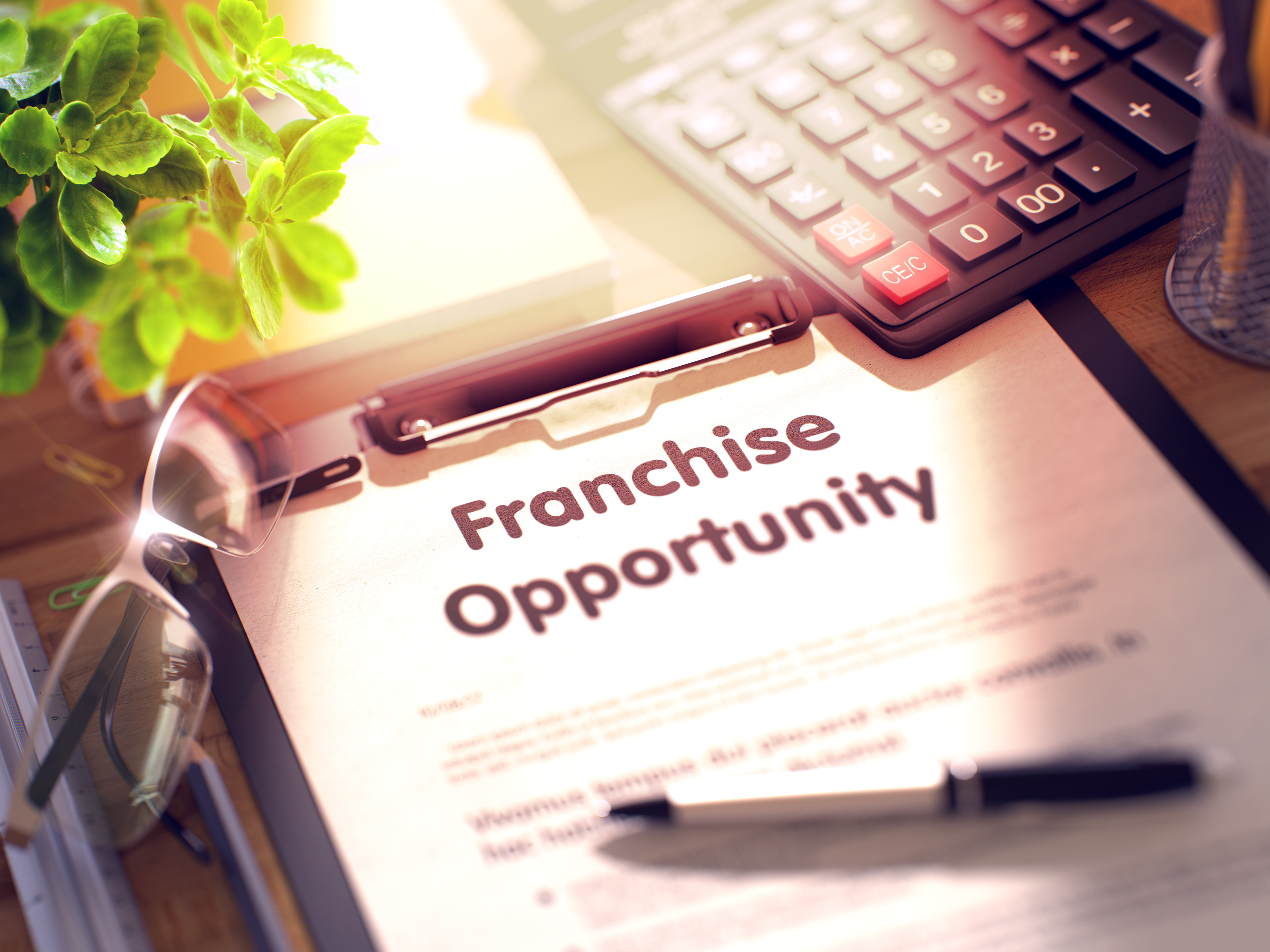
Considering Buying a Franchise?
Are you considering buying a franchise? If you’ve been asking yourself questions about becoming a business owner and buying a franchise of your own, good for you! When it comes to being a franchise owner consider the following thoughts.
Structure
1. You Prefer Structure & Order to Things: Franchises rely on a proven system for their success. They’ve worked hard to perfect a roadmap to help you, as a franchisee, succeed. So if you prefer a structured environment and order, owning a franchise and having a guide may be right for you.
Teamwork
2. You Think Teamwork Makes the Dream Work: Do you love working with a team? In the franchise world collaboration isn’t just appreciated, it’s practically expected. If you enjoy being part of a team then you should consider buying a franchise.
Listening
3. You’re Good at Active Listening: As a franchise owner you will hear much feedback. This will come from your employees, your customers, and others in your franchise group. The idea of active listening is to find a mutual solution for all involved. If you’re someone who enjoys feedback and can learn and build from that, then franchising may be a good fit for you.
Determination
4. You’re Not the Quitting Type: Running a franchise is not for the faint of heart. Even with a road map for success, the start of your franchise journey will be time consuming. There will be paperwork, marketing considerations, and more. But if you’re a determined person who loves a good challenge, the franchise world is waiting!
Repetition
5. You Appreciate the Simplicity of a Good Ham Sandwich: Are you the type of person that orders the same meal at a restaurant, simply because you know you’ll be satisfied with it? Well, franchising depends on that outlook. Franchises are successful partly because of their consistency and committment to quality products. Repetition is the “secret sauce” of any good franchise.
Support
6. You Have a Strong Support System: Starting a new business can be daunting. Having a support system is a lifesaver. You’ll have several, hopefully, in the form of not just other franchisees and your franchisor, but also in your family and friends. Running a business is hard. Make sure you’ve got people around you who love you and want to see you succeed.
Ready to see what’s available? Check out our current franchise resale listings.
Read More
Essential Meeting Tips for Buyers & Sellers

The buyer-seller meeting is quite often a “make or break” meeting. Your business broker or M&A Advisor will do everything possible to ensure that this meeting goes as well as possible.
It is vitally important to realize that rarely is there an offer before buyers and sellers actually meet. The all-important offer usually comes directly after this all-important meeting. As a result, you want to ensure that meetings are as positive and productive as possible.
Buyers need to understand how the process of selling a business works and what is expected of them from the process. Buyers also need to understand that following their broker’s advice will increase the chances of a successful outcome.
Sellers should be ready to be honest and forthcoming during the meeting. They also want to be sure to not say or do anything that could come across as a strong-armed sales tactic.
Asking the Right Questions
If you are a buyer preparing to meet a business owner for the first time, you’ll want to make sure any questions you ask are appropriate and logical. It is important for buyers to place themselves in the shoes of the other party.
Buyers also shouldn’t show up to the buyer-seller meeting without having done their homework. So be sure to do a little planning ahead so that you are ready to go with good questions that show you understand the business.
Building a Positive Relationship
Buyers should, of course, plan to be polite and respectful. They should also be prepared to avoid discussing politics and religion, which often can be flashpoints for confrontation. When sellers don’t like prospective buyers, then the odds are good that they will also not place trust in them.
For most sellers, their business is a legacy. It quite often represents years, or even decades, of hard work. Needless to say, sellers value their businesses. Many will feel as though it reflects them personally, at least in some fashion. Buyers should keep these facts in mind when dealing with sellers. A failure to follow these guidelines could lead to ill will between buyers and sellers and negatively impact the chances of success.
Sellers Should Be Truthful
Sellers also have a significant role in the process. While it is true that sellers are trying to sell their business, they don’t want to come across as a salesperson. Instead, sellers should try to be as real and honest as possible.
Every business has some level of competition. With this in mind, sellers should not pretend that there is zero competition. A savvy buyer will be more than a little skeptical.
The key to a successful outcome is for business brokers and M&A Advisors to work with their buyers and sellers well in advance and make sure that they understand what is expected and how best to approach the buyer-seller meeting. With the right preparation, the odds of success will skyrocket.
Copyright: Business Brokerage Press, Inc.
The post Essential Meeting Tips for Buyers & Sellers appeared first on Deal Studio – Automate, accelerate and elevate your deal making.

Negotiating the Price Gap Between Buyers and Sellers

Sellers generally desire all-cash transactions; however, oftentimes partial seller financing is necessary in typical middle market company transactions. Furthermore, sellers who demand all-cash deals typically receive a lower purchase price than they would have if the deal were structured differently.
Although buyers may be able to pay all-cash at closing, they often want to structure a deal where the seller has left some portion of the price on the table, either in the form of a note or an earnout. Deferring some of the owner’s remuneration from the transaction will provide leverage in the event that the owner has misrepresented the business. An earnout is a mechanism to provide payment based on future performance. Acquirers like to suggest that, if the business is as it is represented, there should be no problem with this type of payout. The owner’s retort is that he or she knows the business is sound under his or her management but does not know whether the buyer will be as successful in operating the business.
Moreover, the owner has taken the business risk while owning the business; why would he or she continue to be at risk with someone else at the helm? Nevertheless, there are circumstances in which an earnout can be quite useful in recognizing full value and consummating a transaction. For example, suppose that a company had spent three years and vast sums developing a new product and had just launched the product at the time of a sale. A certain value could be arrived at for the current business, and an earnout could be structured to compensate the owner for the effort and expense of developing the new product if and when the sales of the new product materialize. Under this scenario, everyone wins.
The terms of the deal are extremely important to both parties involved in the transaction. Many times the buyers and sellers, and their advisors, are in agreement with all the terms of the transaction, except for the price. Although the variance on price may seem to be a “deal killer,” the price gap can often be resolved so that both parties can move forward to complete the transaction.
Listed below are some suggestions on how to bridge the price gap:
- If the real estate was originally included in the deal, the seller may choose to rent the premise to the acquirer rather than sell it outright. This will decrease the price of the transaction by the value of the real estate. The buyer might also choose to pay higher rent in order to decrease the “goodwill” portion of the sale. The seller may choose to retain the title to certain machinery and equipment and lease it back to the buyer.
- The purchaser can acquire less than 100% of the company initially and have the option to buy the remaining interest in the future. For example, a buyer could purchase 70% of the seller’s stock with an option to acquire an additional 10% a year for three years based on a predetermined formula. The seller will enjoy 30% of the profits plus a multiple of the earnings at the end of the period. The buyer will be able to complete the transaction in a two-step process, making the purchase easier to accomplish. The seller may also have a “put” which will force the buyer to purchase the remaining 30% at some future date.
- A subsidiary can be created for the fastest growing portion of the business being acquired. The buyer and seller can then share 50/50 in the part of the business that was “spun-off” until the original transaction is paid off.
- A royalty can be structured based on revenue, gross margins, EBIT, or EBITDA. This is usually easier to structure than an earnout.
- Certain assets, such as automobiles or non-business-related real estate, can be carved out of the sale to reduce the actual purchase price.
Although the above suggestions will not solve all of the pricing gap problems, they may lead the participants in the necessary direction to resolve them. The ability to structure successful transactions that satisfy both buyer and seller requires an immense amount of time, skill, experience, and most of all – imagination.
The post Negotiating the Price Gap Between Buyers and Sellers appeared first on Deal Studio – Automate, accelerate and elevate your deal making.

Finding the Best Business for You

Owning a business and owning the right kind of business for you are, of course, two wildly different things. Owning the wrong kind of business can make you absolutely miserable. So if you are considering buying a business, it is prudent that you invest the time and effort into determining the best kind of business for your needs and your personality. In a recent Forbes article, “What is the Right Type of Business for You to Buy?” author Richard Parker explores how buyers should go about finding the right business fit.
Parker is definitely an expert when it comes to working with buyers as he has spoken with an estimated 100,000 buyers over his career. In that time, Parker has concluded that it is critical that you don’t “learn on your own time.”
His key piece of advice concerning what type of business to buy is as follows. “While there are many factors to be considered, the answer is simple: whatever it is you do best has to be the single most important driving factor of the revenues and profits of any business you consider purchasing.” And he also believes that expertise is more important than experience. Parker’s view is that it is critical for prospective buyers to perform an honest self-assessment in order to identify their single greatest business skill and area of expertise. The last thing you want to do is pretend to be something that you are not.
Parker makes one very astute point when he notes, “Small business owners generally wear many hats: this is usually why their businesses remain small. Remember that every big business was once a small business.” As Parker points out, whoever is in charge of the business will ultimately determine how the business will evolve, or not evolve. Selecting the right business for you and your skillsets is pivotal for the long-term success of your business.
All of this adds up to make the process of due diligence absolutely essential. Before buying a business, you must understand every aspect of that business and make certain that the business is indeed a good fit for you. According to Parker, if you don’t love your business, it will have trouble growing. This point is impossible to refute. Owning and growing a business requires a tremendous amount of time and effort. If you don’t enjoy owning and/or operating your business, success will be a much more difficult proposition.
Finding the right business for you is a complicated process even after you have performed a proper evaluation of your skills and interests. After all, do you really want a solid business with great potential for growth that you would hate owning? By working with brokers and M&A advisors, you can find the best business fit for your needs, personality, and goals. These professionals are invaluable allies in the process of discovering the right business for you.
Copyright: Business Brokerage Press, Inc.
The post Finding the Best Business for You appeared first on Deal Studio – Automate, accelerate and elevate your deal making.

Tackling Growth Delusions When Buying a Business
 There is no doubt about it, it can be exciting to buy a new business. However, in the process, it is very important that you don’t become unrealistic about future growth. Keep in mind that in the vast majority of cases, if a business is poised to quickly grow substantially, the seller would be far less interested in selling.
There is no doubt about it, it can be exciting to buy a new business. However, in the process, it is very important that you don’t become unrealistic about future growth. Keep in mind that in the vast majority of cases, if a business is poised to quickly grow substantially, the seller would be far less interested in selling. Richard Parker’s recent article for Forbes entitled “Don’t Be Delusional About Growth When Buying a Business” seeks to instill a smart degree of caution into prospective buyers. Parker notes that when evaluating a business and talking to the owner, many buyers come away with a sense that enormous growth is just “sitting there” waiting to be seized. In particular, Parker cautions those buyers who are buying into an industry that they know nothing about; those individuals should be very careful.
When buying into an industry where one has no familiarity, there can be a range of problems. The opportunities that you see may not have been tapped into by the existing owner for a range of reasons. You couldn’t possibly guess what these reasons might be without more of a knowledge base. Since you are an outsider, you likely lack the proper perspective and understanding. In turn, this means you may see growth opportunities that may not exist, as the seller may have already tried and failed. Summed up another way, until you actually own the business and are running it on a day to day basis, you simply can’t make a proper assessment of how best to grow that business.
The seductive lure of growth shouldn’t be the determining factor when you are looking for a business. A far more important and ultimately reliable factor is stability. The real question, the foundation of whether or not a business is a good purchase option, is whether or not the business will maintain its revenue and profit levels once you’ve signed on the dotted line and taken over. You want to be sure that the business doesn’t have to grow to remain viable.
As Parker points out, the majority of small business buyers will buy in a sector where they don’t have much experience, and that is fine. What is not fine is assuming that you can greatly grow the business. Of course, if new buyers can achieve that goal, that is great and certainly icing on the cake. But don’t depend on that growth.
In the end, everyone has some ideas that work and some that don’t. You may take over a business and, thanks to having a different perspective than the previous owner, are able to find ways to make that business grow. But realize that many of your ideas for growing the business may fail completely.
A professional business broker will be able to help you determine what business is best for you. A business broker will help keep you focused on what matters most and steer you clear of the mistakes that buyers frequently make when buying a business.

A Closer Look at 3 Major Factors to Consider When You Buy a Business
 The simple but undeniable fact is buying a business is one of the single greatest financial decisions a person can make. Buying a business can lead to great financial success or great financial failure. This fact helps to underscore why it is so important to work with an experienced broker who can help guide you through the often labyrinthian process of buying a business.
The simple but undeniable fact is buying a business is one of the single greatest financial decisions a person can make. Buying a business can lead to great financial success or great financial failure. This fact helps to underscore why it is so important to work with an experienced broker who can help guide you through the often labyrinthian process of buying a business.
In a July 2019 article from Smallbusiness.co.uk, author Kyle Carins explores three key factors that everyone should consider before they buy a business. The first factor covered in Carins’ article, “3 Things to Consider When Buying a Business,” is appeal vs. viability.
Appeal Vs. Viability
Not surprising, the most important variable for most prospective owners is that the business is indeed viable. Not being able to differentiate between an appealing business and one that is viable can lead to financial disaster.
As Carins points out, “Do you want to make money or do you want to fulfill a dream?” Sometimes those two variables can intersect, but not always and not often. In the end, it is vital to know whether a given business is, in fact, potentially lucrative.
However, as Carins points out, it is also important that you choose a business that you will enjoy. Nothing can be more spirit crushing than running a business that you truly hate, even if it is lucrative. Selecting the right business for you is something of a balancing act that must take in a variety of often competing variables.
Considering Hidden Costs
The second factor that Carins looks at is the issue of “hidden costs.” One of the key reasons that it is so important to work with a business broker is that a business broker understands these kinds of factors that you might otherwise overlook. Due diligence is amazingly important. For those who have never bought a business before, working with a business broker offers substantial protection against making a potentially serious mistake.
Second Opinions
The third factor examined in Carins article is “Getting a second opinion.” For Carins, getting a second opinion is actually linked to due diligence. He feels that additional opinions regarding a given business should go beyond working with professionals and should also include talking to friends and family who know you well. Additional opinions can help one see angles that might otherwise be missed.
Again, buying a business is complicated and will take up a good deal of one’s time and mental energy. Your friends and relatives, understand your personality and your wants and desires. Their input can be particularly beneficial.
Finding an experienced business broker can help you do more than simply establish whether or not a given business is a “good deal.” Brokers with years of proven experience can also help you determine whether or not a specific business is a good fit for you and your lifestyle.

